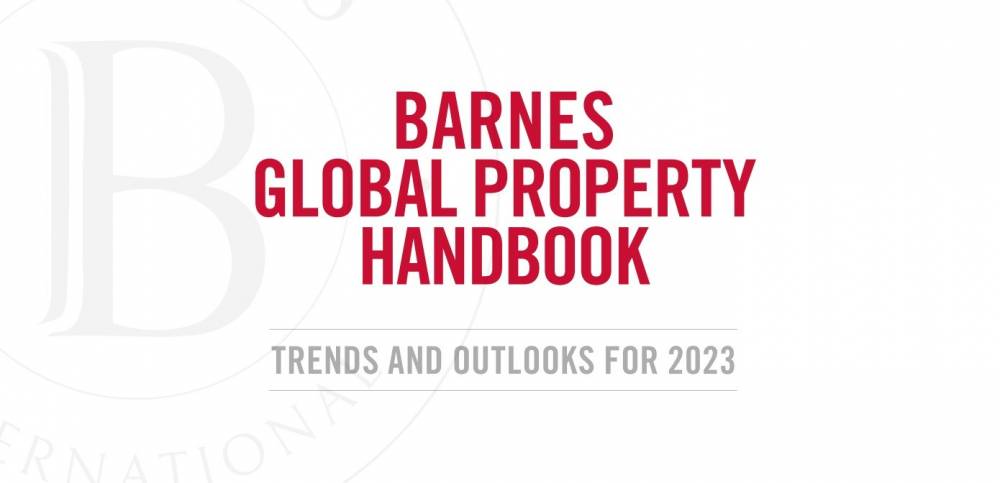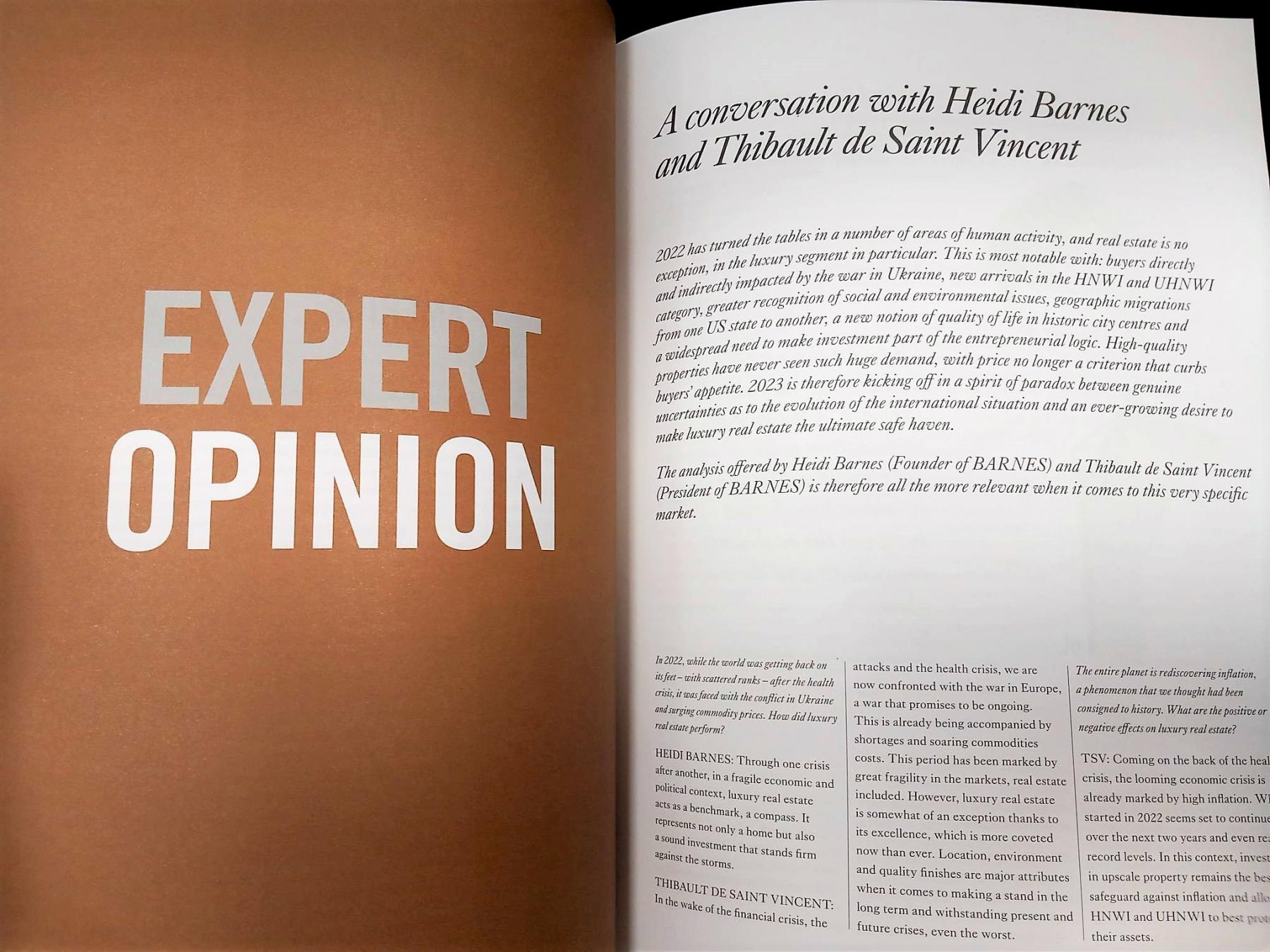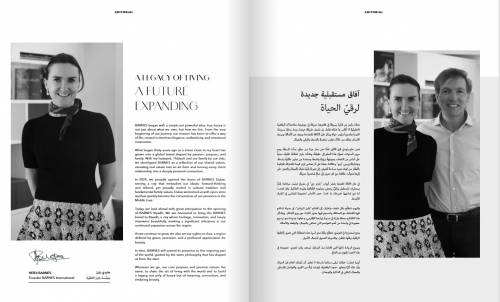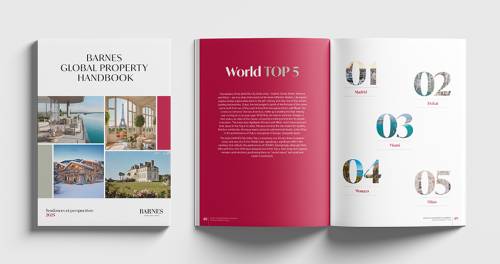

Trends and Outlooks for 2023: A Conversation with Heidi Barnes and Thibault de Saint Vincent

2022 has turned the tables in a number of areas of human activity, and real estate is no exception, in the luxury segment in particular. This is most notable with: buyers directly and indirectly impacted by the war in Ukraine, new arrivals in the HNWI and UHNWI category, greater recognition of social and environmental issues, geographic migrations from one US state to another, a new notion of quality of life in historic city centres and a widespread need to make investment part ofthe entrepreneurial logic. High-quality properties have never seen such huge demand, with price no longer a criterion that curbs buyers appetite. 2023 is therefore kicking off in a spirit ofparadox between genuine uncertainties as to the evolution of the international situation and an ever-growing desire to make luxury real estate the ultimate safe haven.
The analysis offered by Heidi Barnes (Founder of BARNES) and Thibault de Saint Vincent (President of BARNES) is therefore all the more relevant when it comes to this very specific market.
In 2022, while the world was getting back on its feet - with scattered ranks - after the health crisis, it was faced with the conflict in Ukraine and surging commodity prices. How did luxury real estate perform?
HEIDI BARNES:
Through one crisis after another, in a fragile economic and political context, luxury real estate acts as a benchmark, a compass. It represents not only a home but also a sound investment that stands firm against the storms.
THIBAULT DE SAINT VINCENT:
In the wake of the financial crisis, the attacks and the health crisis, we are now confronted with the war in Europe, a war that promises to be ongoing.
This is already being accompanied by shortages and soaring commodities costs. This period has been marked by great fragility in the markets, real estate included. However, luxury real estate is somewhat of an exception thanks to its excellence, which is more coveted now than ever. Location, environment and quality finishes are major attributes when it comes to making a stand in the long term and withstanding present and future crises, even the worst.
The entire planet is rediscovering inflation, a phenomenon that we thought had been consigned to history. What are the positive or negative effects on luxury real estate?
TSV: Coming on the back of the health crisis, the looming economic crisis is already marked by high inflation. What started in 2022 seems set to continue over the next two years and even reach record levels. In this context, investing in upscale property remains the best safeguard against inflation and allows HNWI and UHNWI to best protect their assets.
“Beyond these tools, however sophisticated they are, a successful transaction is the culmination of a relationship of trust between the real estate consultant and their client.” HEIDI BARNES
HB: Against a backdrop of inflation, it is natural to prioritise the best locations at the world’s top destinations, which is why the international cities in the BARNES City Index and the top holiday destinations among our clientele represent the best guarantor for their investments.
In barely three years, real estate hasexperienced an extraordinary technological transformation, converting to an almost entirely digital format in record time. Is this an irreversible momentum?
TSV: The health crisis and repeated lockdowns have accelerated this technological metamorphosis. In order to continue serving their clients, all real estate players have had to adapt to new technologies without delay.
As of May 2020, BARNES enabled its clients to access virtual viewings of its entire portfolio of properties available for sale and rental. These new technologies open up new avenues for and place new expectations on real estate professionals, who must not let down their clients. This means that the property, which they view physically as part of a second phase, needs to correspond to both the description and their expectations.
HB: Thats right, what the client experiences online needs to carry over seamlessly into their physical viewing of the property. The return to normal in 2022 has demonstrated that our clients remain attached to real-life encounters with all real estate players. When it comes to luxury properties, therefore, a real-life discussion with expert consultants and an in-person viewing of properties are still a must.
Has this real estate digitalisation changed your relationship with your clients, whether buyers or vendors?
HB: This digitalisation is a tool that we can put to best use for our clients. It is a means and not an end in itself. At BARNES, the relationships we build with our clients remain founded on solid values like trust, vision, excellence, elegance and global support. A decision as important as buying upmarket real estate, which often represents several decades of work in the luxury real estate segment, cannot be taken lightly. Beyond these tools, however sophisticated they are, a successful transaction is the culmination of a relationship of trust between the real estate consultant and their client.
The concept of a “semi-primary” residence seems to have taken root, that is to say the possibility of a semi-permanent occupancy incorporating remote working while enjoying greater quality of life in the countryside and mountains or on the oceanfront. What will be the next developments in use?
TSV: Although this concept existed on a marginal level prior to 2020, it has indeed taken root since. Many of our clients alternate life in the city and by the ocean, in the country or in the mountains. And those working in new technologies or in positions of responsibility within multinationals often split their time between different cities or even countries. Miami or St. Barts in winter and Lisbon or the Cote d'Azur in summer... they seem to have definitively adopted a new lifestyle, a lifestyle of luxury nomads. One result of this is that they rent out their properties for part of the year when not living there.
Seasonal rental does indeed seem to be a new feature of luxury real estate ...
HB: It is indeed a fairly recent phenomenon in this segment. Even if they don’t need to do so for financial reasons, owners have become accustomed to renting out their properties when they are not staying there, on the premise that an occupied house is always better maintained than an empty house. That’s the logic yacht owners have been working off for generations! And it has transformed the profitability of these houses and villas, which often provide annual net returns over 3% on properties that also increase in value at the same time.
TSV: On the tenant side, the health restrictions have led wealthy families to favour private residences over hotels, even 5-star hotels, provided they come with an equivalent service level. The upscale seasonal rental market has consequently experienced unprecedented expansion on the oceanfront and in the mountains, but also in cities. Seasonal rental is completely shaking up the deck when it conies to luxury real estate.
The notion of services, personalisation and made-to-measure is becoming the new standard, particularly within luxury new developments in the US, Europe and Asia. Does this reflect a change in aspirations for buyers?
TSV: The luxury real estate clientele is mainly comprised of HNWI and UHNWI. Many are entrepreneurs and aesthetes who travel, either for pleasure or business. Depending on their professional and family plans, they spend anywhere from three days to three months in international cities or top holiday destinations on the oceanfront, in the mountains or in the countryside. And this is the case in all countries.
HB: What they want is to be free from any management worries linked to the property so that they can focus on the essential. Which is why they prioritise luxuriously furnished and equipped properties with the full range of concierge services including daily house cleaning, a chef, and access to high- end shared facilities. Eor these wealthy clients, access to a club with a private restaurant, a gym, a cinema, a spa, reception rooms and a business centre is becoming the norm.
Entrepreneurship in 2022 has changed from what it was 10 or 20 years ago. 1 here seems to be a heightened international focus among business owners nowadays. How is this reflected in luxury real estate?
HB: The UHNWI clientele, which represents the backbone of the property market, is primarily composed of entrepreneurs. This entrepreneurial mindset has thus become an integral part of luxury real estate. Entrepreneurs look for new, high-potential destinations and new neighbourhoods at already known destinations. Moreover, they want to bring added value to their investments by undertaking construction and renovation projects on apartments, villas and chalets.
Many take on hotel projects and make investments that enable them to combine passion and entrepreneurship in areas like innovative agriculture, vineyards, horse farms, hunting estates and golf courses.
TSV: Driven by a real business spirit, upmarket buyers are now exhibiting an aptitude for diversification, not only in the types of properties that interest them - villas, houses and apartments as well as chateaux, vineyards and hunting estates - but also in their location. From New York to Paris and Lisbon, from Miami to Dubai and Saint Tropez, and from the Atlantic Coast to winter sports resorts, exceptional properties are the objects of desire for these new collectors. Just like works of art, they recognise their aesthetic, financial and asset value.
“In a constantly evolving world, the big question will be how entrepreneurs adapt to changes in the modern world and how international cities and upmarket holiday destinations adapt to these ever-more numerous and demanding entrepreneurs.” THIBAULT DE SAINT VINCENT
Philanthropy is ever more present among the priorities of the world s largestfortunes. What is behind this?
HB: Billionaires have, by the very fact of their status, an infinite variety in the choice of their passions and hobbies. It is therefore remarkable that philanthropy comes in first. More than half of billionaires are known to be actively involved in philanthropic activities, whether through charitable organisations they have created for this purpose or in other ways.
TSV: Society as a whole expects more and more of billionaires, who are supposed to distribute a share of their wealth against a global backdrop of growing socio-economic and environmental inequalities. What’s more, States and governments have realised this and encourage this sector through tax exemptions, reductions and credits in exchange.
The BARNES City Index 2023 has once again revealed a number of changes in the ranking of the top citiesfor HNWI and UHNWI worldwide. Which cities or geographic regions would you say are the ones to watch as of 2023?
HB: A number of destinations certainly stand out from the crowd. For cities, although the traditional hotspots like London, New York and Paris have retained their appeal, others are experiencing particular popularity, such as Dubai in the Middle East, Madrid and Lisbon in Europe, Austin and Miami in the US, and Singapore and Tokyo in Asia.
TSV: In 2023, the real phenomenon is set to be Dubai, which has already become the ultimate city of the future. Compared to old-world cities like Paris, London and New York, Dubai is seen as the new-world capital along with cities like Miami, Austin, Madrid and Lisbon. The common denominator among these cities is a young and international population led by a large number of innovative entrepreneurs.
Cryptocurrencies have experienced ups and downs in 2022, particularly following the bankruptcy of FTX and BlockFi. Were the big real estate players somewhat hasty in announcing cryptocurrencies as a market revolution?
TSV: When cryptocurrencies appeared, they represented a new technology poised to revolutionise the acquisition process and simplify the movement of capital both in the financial markets and the property market. It was therefore only natural that large numbers of projects emerged in conjunction with this new tool. Euphoria quickly took over the markets, which were filled with enthusiasm. In a decentralised and entirely unrestrained market context, numerous bubbles formed. Many players thus learned at their expense to be more selective, and to single out projects built on solid foundations. Having passed the acid test, cryptocurrencies are ready to start 2023 on a more solid footing.
HB: The use of cryptocurrencies is emerging as a particularly relevant option for international property transactions, which fall prima facie within the scope of the luxury market. The use of blockchain removes obstacles linked to monetary exchange and control while guaranteeing absolute digital security. The next two years willlikely be marked by the implementation of regulations governing cryptocurrency use and practices, however, in order to provide full reassurance for investors.
By 2025, cryptocurrencies are expected to make up a large proportion of transactions on what will be a more mature market.
Well end with the traditional question: what are the outlooks for the international luxury property market in 2023 and 2024?
TSV: Over the coming years, the quest for excellence will be what guides buyers, who will continue to prioritise location, location, location.
In a constantly evolving world, the big question will be how entrepreneurs adapt to changes in the modern world and how international cities and upmarket holiday destinations adapt to these ever-more numerous and demanding entrepreneurs. As playersin high-end international real estate, our role will be to anticipate the needs of this clientele as best as possible by remaining attentive. Given that all experts are predicting exponential growth in the number of wealthy clients over the next decade, luxury international real estate has a bright future ahead. Par for the course in a market where demand structurally outstrips supply.
BARNES GLOBAL PROPERTY HANDBOOK - TRENDS AND OUTLOOKS FOR 2023
1.jpg)



